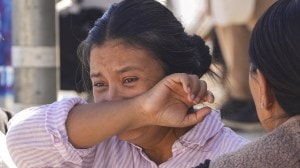The Early Years: Training on early childhood development for orphanage staff is critical
Addressing children while sitting beside them rather than while standing and looking down at them; using a warm and pleasant tone of voice; making eye contact and smiling at them are a few examples of child centred behaviour.
 Making eye contact and smiling at children is part of positive reinforcement. (Source: Getty Images)
Making eye contact and smiling at children is part of positive reinforcement. (Source: Getty Images)
By Abha Ranjan Khanna
In the recent past many articles and reports have been published on the plight of children in Indian orphanages and homes and none of these even mention children with developmental delays and/or disabilities in these spaces.
The articles highlight the numerous ills and the pathetic conditions that children in orphanages endure. Corporal and coercive punishment, hitting, spanking, withholding food, limitation on movement, harsh and humiliating language and intimidation are regularly used by more than 50 per cent of orphanages as a form of chastisement of the children in their care.
In fact, these very negative and abusive environments create disabling mental, emotional and physical conditions in children. Regular typical children entrusted in the care of orphanages and children’s homes become disabled and stunted because of the abuse and neglect they experience. The apathy that children with disabilities are subjected to is inhumane and indescribable.
Research indicates that placement of institutionalised children becomes increasingly difficult for adoption as they acquire developmental delays and disabilities. Further, even if they appear to have age appropriate skills at younger ages, almost 60 per cent of all adopted children display serious difficulties as they grow (learning disabilities, autism like behaviours, reactive attachment disorders).
Currently, there is a global movement to ensure Early Childhood Care and Development (ECCD) as a right for every child. There is a push for ECCD through international frameworks like Sustainable Development Goals and national policies like Rights of Persons with Disabilities Act (2016), National Child Policy (2013) and National ECCE Policy (2013) in India.
The most important factor for ensuring that children in orphanages and children’s homes grow to realise their full potential is that of nurturing care. This would require a paradigm shift in the way adults view Early Childhood Care and Development. To achieve this, a determined effort and push to systematically train orphanage staff on early childhood care, development and intervention is essential. Caregivers of very young children must know about developmental milestones, about the need for tender loving care, safety and security and child centred behaviours and attitudes. Orphanages and homes must make Early Childhood Care and Development mandatory training for all staff that interact with very young children.
Addressing children while sitting beside them rather than while standing and looking down at them; using a warm and pleasant tone of voice while talking to children; making eye contact and smiling at them; allowing children to do simple tasks that are age appropriate like finger feeding at nine months of age are a few examples of child centred behaviours. Staff must be made aware of the consequences of their harsh behaviours on children and must be trained on positive reinforcement concepts.
Awareness on how to make the environment child-friendly and safe is another important factor in nurturance that the staff must be aware of. Caregivers must also be oriented towards the importance of daily routine activities and how they can engage with the children to make these teachable moments. For example, talking about body parts at bath time and colours and shapes during meal time will ensure that children are stimulated and learning.
Building adult capabilities with small changes in their behaviours will go a long way in the children’s development and later life.
(The writer is an occupational therapist.)





- 01
- 02
- 03
- 04
- 05


























